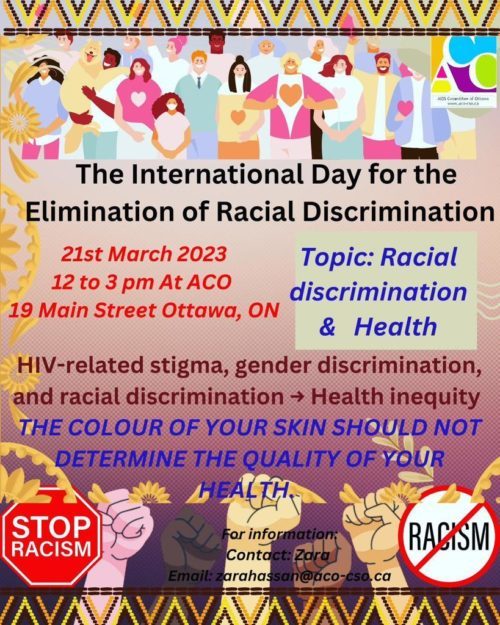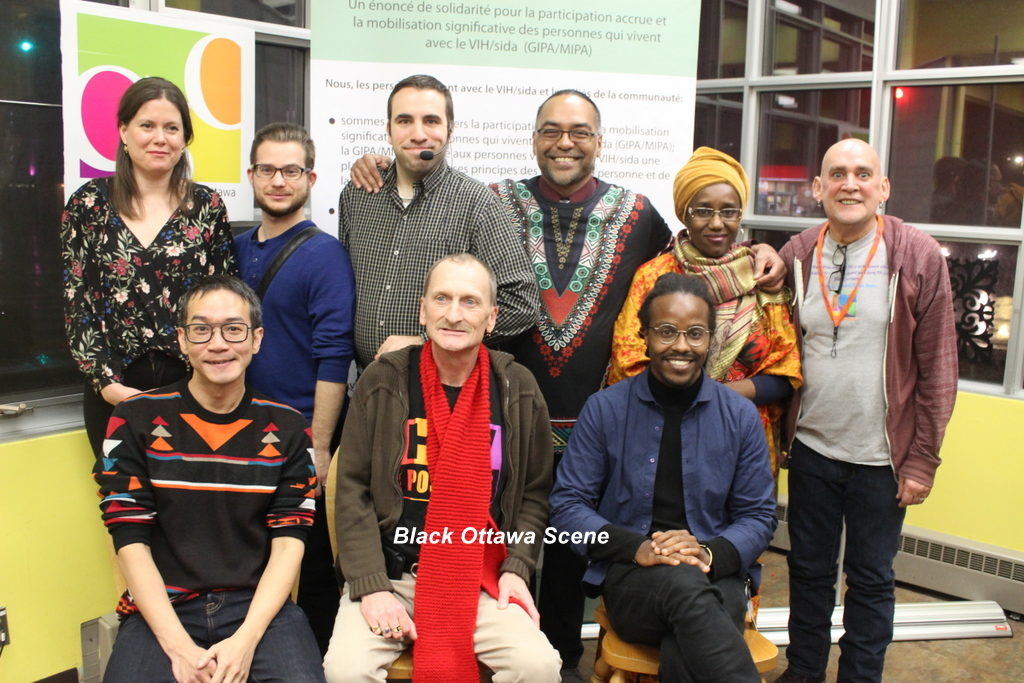
by Ruth Aman
Tuesday 21 March 2023
March 21 is annually celebrated as the International Day for the Elimination of Racial Discrimination. In 1960, during apartheid in South Africa, citizens of Sharpeville held a peaceful demonstration asking the government to deal with the system once and for all.
Unfortunately, this demonstration became violent as police became aggressors and killed 69 people. This day is held in remeberance of the victims of that massacre.
Years later, the General Assembly of the United Nations came together to officially commemorate the day and name it the The International Day for the Elimination of Racial Discrimination. Since 1979, this day and a number of inititives have been undertaken by the UN to fight against racism as part of the Decade for Action to Combat Racism and Racial Discrimination, which was held from 1973 to 1982.

The AIDS Committee of Ottawa (ACO) gathered its community members to commemorate this day with a presentation and discussion on the issues of discrimination that many face, not only in Canada as a whole but specifically within Ottawa. They held the event at their headquarters in downtown Ottawa and members and guests of diverse backgrounds were present. Representatives from Capital Rainbow Refuge and GetAKit were also present. At 1pm, roughly 40 individuals gathered in the ACO’s main lobby and the event began once hosts Haoua Inoua and Zara Hassan approached the presentation board.

ACO is an organization that has operated since 1985 to support those who are impacted by or at risk of HIV/AIDS in Ottawa. They do this by providing outreach services, information workshops, advocacy and health services to promote the mental and physical well-being of those within the community.

Before beginning the presentation portion, the ACO hosts welcomed all who had come and stated that this day is not a day of ‘celebration’, but commemoration and that they hoped it would push those listening to advocate for better and empower people in their fight against discrimination.
Hassan began speaking about the history of the event. She referred to the incident in Sharpeville, South Africa and then how that event progressed in its recognition as International Day for the Elimination of Racial Discrimination.
Following this, the presentation then began to elaborate on the term ‘discrimination’ itself and the many ways it manifests. Hassan covered topics such as characteristics of discrimination, discrimination and health, and the importance of recognizing this day. A highlight of this presentation was the explanation Hassan gave on the importance of this day. Three reasons were given: firstly, it fosters anti-toleration for the prevalent discrimination culture, it encourages those affected to stand up for their rights, and lastly, it reminds all that peace and acceptance are important.
After she had finished her presentation, she then opened the room to the guests and asked them to share questions, comments, or reflections they had. This discussion allowed for sensitive topics and problems to be spoken of as people became vulnerable with their struggles and bravely shared the stories of discrimination they had experienced.
Some guests asked questions in regard to their rights. ‘As newcomers, we are always told of the responsibilities we have, yet we are never told of the rights we have to protect ourselves’, said one young woman. She had come recently to Canada from the Middle East and was facing subtle forms of discrimination. Unfortunately, she was struggling to properly confront the discrimination because she had no actual evidence and it was ‘non-verifiable’. She had faced discrimination from those in her own community, from health care workers, and from those working in the NGO-sector, yet none of the reports she made were taken seriously because this discrimination was too subtle. This led her to ask what her rights were and how laws could protect her from this form of abuse.
Another woman of African descent stated that she had experienced these types of discrimination well, yet was frustrated because she knew she couldn’t address it. Therefore, her question was how to properly deal with the stress she felt and cope with what she faced. The ACO team provided numerous ways to deal with it by reminding her that everyone copes differently. However, one common sentiment was that she should confront it rather than stay silent about it. If she stays silent, the oppressors may continue on with their biases and target others; however, if she confronts it, it’s almost a warning shot to the individual committing these travesties. Just because it is subtle doesn’t mean its not racism! Therefore, they assured her that she has a right and responsibility to stand up for herself and those coming after her.
Overall, this event provided many with the necessary tools and comfort they need to deal with the troubles they face. Not only was it a place of education but it was also a safe space for many who are hurting and need support.
******************************************************************

Ruth Aman is a Project Officer with Black History Ottawa. She holds a Bachelor of Global and International Studies (Honors) degree, with a specialization in Law and Social Justice from Carleton University.
